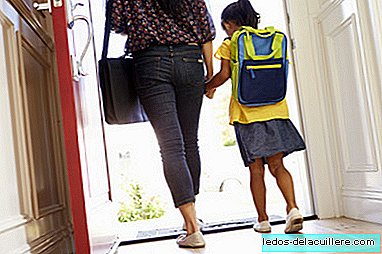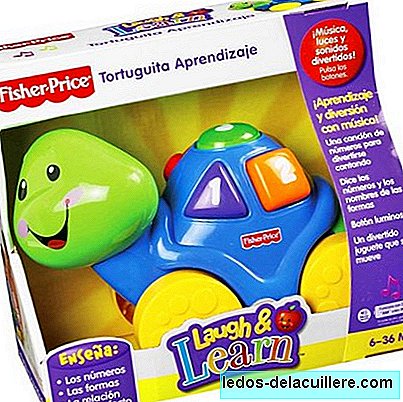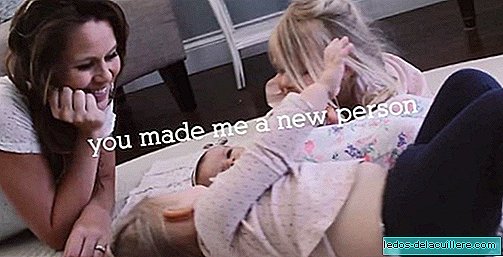It is possible that on more than one occasion you have heard the term "mamitis" associated with a small boy or girl who is considered very spoiled, spoiled and who are little able to fend for themselves, when other adults would expect more autonomous behavior and independent.
After the "diagnosis" come the advice: "Do not pay much attention to him when he cries", "Leave him alone even if he calls you", "Leave us one afternoon and you go a while to learn to be without you", etc. Advice that aims to solve a problem that is not such, unless the child is, say, 5 or 6 years, and then professional help may be necessary.
And I say it's not such, because if we talk about babies or young children, having "mamitis" is not only normal, but it is desirable.
How will it be desirable to depend so much on your mother?
Perhaps it is the question that has crossed your mind after reading the previous sentence. What I really mean is that the desirable thing is that Every boy and girl has a solid and firm bond with the mother, which can also be with the father or another adult.
This link will be with one person or another depending on who has taken care of you for the longest time, although the figures say 93% of the time, the primary caregiver is the mother.
That is why we usually talk about "mamitis" and not about "papitis" or "abuelitis", although the concept would be the same: it is very positive that babies have one of these "adultitis" with a specific person, because that attachment relationship It is the one that really helps you to be more independent.
To be independent, you must first be dependent
A young child knows many things, but he does not know most and, in fact, the most important. You still have to learn them because someone teaches them, or learn them for yourself, and it is much easier for them to do it next to who can teach them, than in the loneliness of exploration.
They say that they are like sponges, and that in the first years they learn at a dizzying pace. It is so, precisely so that they can adapt as soon as possible to the world in which they live, and even then, it is not a matter of months, but of years.
In that process, they need to have the people they trust most next to give them the necessary security to be able to face learning from trust And not from fear.
Thus, in contact with the people who care for you, you can look, you can imitate and you can learn to, little by little, become increasingly independent, from dependence.
If a baby or child doesn't want to be with their mother or father all day, How little I would learn from them! (and how difficult it would be to adapt to society, because in reality I would learn very few things).
And as much as many people expect children to play alone (parents are even told that they have to get used to their children to play alone, because if they don't always need them), it's the opposite: the expected and the ideal is that they don't want to play alone.
Remember, the important thing is not the toy, but the game. And it is much more stimulating and fun to play with someone (whether there is a toy in between or not), to play alone.
Why a strong bond helps children develop better

As I explained a few weeks ago, babies and children need to live in an affectionate and comfortable environment, with parents attentive and willing to react to their demands, so that their main concern is to grow, develop and learn.
If the response of your primary caregiver (usually the mother) is not adequate: sometimes he responds to the demands, sometimes he lets him cry, sometimes he attends to it but without showing affection, sometimes he simply is not ... the baby can lose controlling the situation and not creating a proper bond with the mother, for not knowing how to get what she needs, for her to be for him (I repeat that I say mother for being the one that most frequently becomes the main reference of the baby), and can begin to show features of an insecure attachment relationship.
He secure attachment, which is desirable, we define it as a relationship in which the baby feels loved, safe and confident, and from there he dares to learn and explore, because he knows he has a safety net, which is his mother (in case that something goes wrong and is hurt, in case you are afraid, in case you feel alone, you know that crying you get your care, your attention and your love).
He insecure attachmentConsequently, it is the relationship in which the baby or child is not clear that their referent will respond correctly to their needs. In that situation, he may not dare to try to learn something on his own initiative ("as I don't know if my mother is going to help me if I have problems, I prefer not to try"), to be done increasingly dependent (and not less), and even to follow the mother wherever she goes from fear and anxiety to believe that being alone is in danger.
But if he follows mom, isn't he "mamitis"?
A child who, since he was a little boy, follows his mother, and who gradually needs her less and less, but who looks for her in non-everyday situations (there are unknown people, a lot of noise, new situations that he doesn't understand), does something totally logical: independent at times when you feel safe, and look for the source of security (mom) at times when you feel insecure. This is not "mamitis", this is to have a solid and desirable link.
A child who, on the other hand, still needs her a lot even in everyday situations and who, as we have said, follows her at all times to be by her side, without feeling able to explore or play without separating, may be showing an insecure attachment, and one would have to wonder if the mother's answers to her demands are what the child needs.
In this video you can see a brief explanation of insecure attachment, and of a "mamitis" that should be solved:
If you look at the video, the child looks for the mother, but when he is with her he does not feel good either, because he knows that she doesn't always respond as she really needs.
As I say, it is a "mamitis" that has to be solved, and not as everyone expects: "Leave it alone so that it will learn to need you less"; but quite the opposite: "Try to spend more time with him and respond to his demands of affection and affection, so he needs you less and less."
In summary: the "mamitis" is not a bad thing, and if for someone it is a problem, the solution is clear, increase mom's dose, so that it becomes increasingly autonomous and independent.
Photos | iStock
In Babies and more | The princesses also have tantrums: and we love how their parents handle it, 15 things you have to stop saying to your children, how should our ancestors survive without all the information about parenting we have now?












